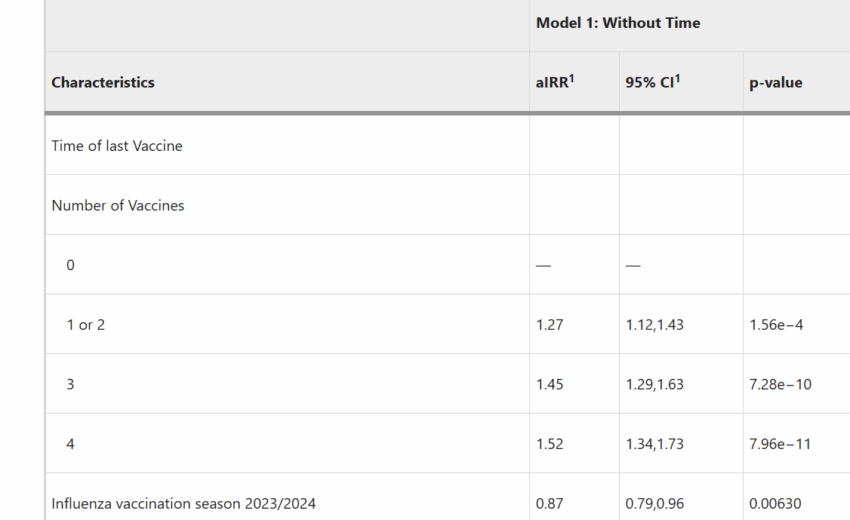People who received booster shots against Covid had a sharply higher risk of becoming ill with flu- or Covid-like symptoms, a new study has found.
The study builds on earlier data from the Cleveland Clinic and provides the strongest evidence yet that mRNA shots make people more likely to suffer repeated respiratory illnesses over time — the opposite of what vaccines are supposed to do.1 As jab advocates and Big Pharma fight a rear-guard action to protect the mRNAs, the new study offers more evidence how badly the shots have failed.
—
(Pfizer is still selling Covid jabs. So I’m still writing the truth about them. With your help.)
—
The researchers tracked almost 2,000 Swiss healthcare workers during the 2023-2024 winter season. They found those who had received one booster were 56 percent more likely to get sick, while those who had received two were 70 percent more likely.
Even after the researchers matched the workers by risk factors, they found those who had received at least one Covid booster were about 50 percent more likely to be sick. They posted their findings on Aug. 9 in an open-access journal published by Nature.
“These findings suggest that COVID-19 boosters may not offer clear short-term benefits in a post-pandemic setting, and may even increase short-term illness risk,” the researchers wrote. “This raises questions about the best use of booster vaccines moving forward.” (That last sentence is a masterpiece of understatement.)
The paper is not the first time that researchers have found that mRNA Covid jabs not only do not work, but may increase the risk of illness. As early as 2022, Cleveland Clinic researchers reported that people who had taken more mRNA shots had a higher risk of Covid.
—
(Mo’ shots, mo’ problems. Risk of flu-like disease, compared to number of jabs. Over 1 is bad.)
—
But the new study has several strengths, including detailed data about the Swiss workers that enabled the researchers to match comorbidities — other risk factors — in who took shots with those who did not.
In addition, the researchers knew when people had gotten shots, and they found the extra risk appeared to lessen over time. That fact is good news for people who took shots years ago and are hoping their immune systems are not permanently impaired. But the fact the risk wanes with time is further evidence the shots themselves, not some hidden statistical factor, are increasing it.
Finally, the researchers reported that people in the study who had taken flu shots had a slightly lower risk of becoming ill with respiratory illnesses. That’s the result one would expect from a vaccine that works (even marginally, as flu shots do in people under 65), and suggests the study was properly designed and run.
—
So why do repeated mRNA shots seem to raise the risk of getting Covid and possibly other respiratory illnesses too?
One possibility is that the shots keep people from developing robust natural immunity to Covid following their first infection. Another is that the problem is even broader, and that the mRNAs have done long-term damage to the immune system that may make people more vulnerable to many different diseases.
—
(Still on the wall. With your help.)
—
Almost five years after health authorities and governments pushed more than 1 billion people to take the mRNAs, we still have far more questions than answers about their long-term effects.
Which isn’t stopping jab advocates — particularly in the United States — from continuing to push them.
What will?
I am aware some of you think the problems with the shots were intentional, not a failure, but let’s not go there.
Click this link for the original source of this article.
Author: Alex Berenson
This content is courtesy of, and owned and copyrighted by, https://alexberenson.substack.com feed and its author. This content is made available by use of the public RSS feed offered by the host site and is used for educational purposes only. If you are the author or represent the host site and would like this content removed now and in the future, please contact USSANews.com using the email address in the Contact page found in the website menu.









